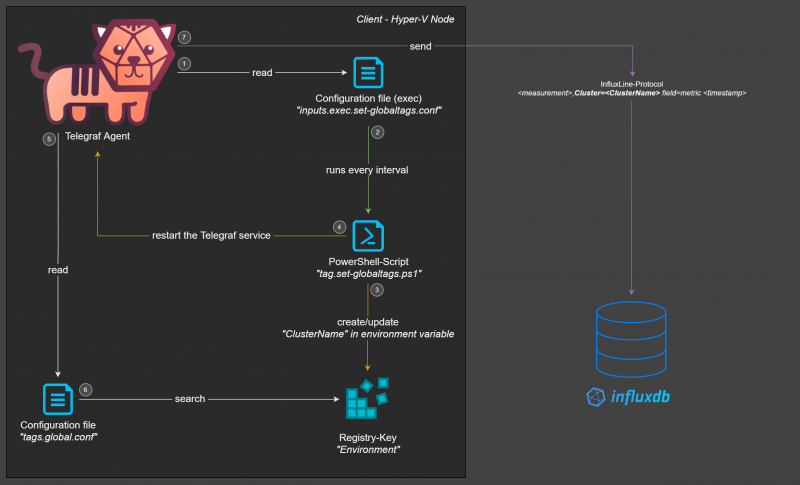Telegraf: Dynamic Tags (global tags)
This is not really a smart solution. This means if you can collect this tag informations different, write this in another measurement and join this later, then I would recommend it this way.
Global tags can be specified in the [global_tags] table in key="value" format. All metrics that are gathered will be tagged with the tags specified.
With dynamic tags we want the use global_tags in a more flexible way. In short: The tags should be updated dynamically.
Inhaltsverzeichnis
Explanation about the workflow
We want to add the ClusterName (Hyper-V Cluster) as a global tag, because we want to have the opportunity to filter/group by the ClusterName.
Because Telegraf have no built-in feature to run commands to define global_tags, we write the the tag "ClusterName" to the Windows Telegraf service environment variables (Registry-Key).
It would also be possible to write the tag to the Windows system environment variables. But it is not recommended.
So we have three important files:
- tags.global.conf: all global tags are defined in this Telegraf configuration file.
- inputs.exec.set-globaltags.conf: this runs only the PowerShell script without any output.
- tag.set-globaltags.ps1: PowerShell script that gets information about the ClusterName and put it into a RegKey as environment variables for the service "Telegraf".
Workflow
- The Telegraf Agent reads inputs.exec.set-globaltags.conf
- and runs every 4h the PowerShell script tag.set-globaltags.ps1 because of the defined "interval".
- The PowerShell script tag.set-globaltags.ps1 runs a command to get the ClusterName and create/update the RegKey "Environment" with the ClusterName.
- The PowerShell script restart the service "Telegraf".
- Because of the restart of the Telegraf service, Telegraf reads the global_tags defined in the file "tags.global.conf".
- In the tags.global.conf there is a tag named "Cluster" defined. This tag has the value "$ClusterName" (this is an Windows service environment variable). Telegraf searches the environment variable "ClusterName" in the environment variable of the service.
- Telegraf find the the environment variable "ClusterName" and add a tag named Cluster with the value of the ClusterName to all metrics that are send to the InfluxDB.
Telegraf global_tags configuration file "tags.global.conf"
# Global tags can be specified here in key="value" format. [global_tags] # dc = "us-east-1" # will tag all metrics with dc=us-east-1 # rack = "1a" ## Environment variables can be used as tags, and throughout the config file # user = "$USER" Cluster = "$ClusterName"
Telegraf exec plugin file "inputs.exec.set-globaltags.conf"
[[inputs.exec]] commands = ['powershell -NoProfile -File "C:\Program Files\Telegraf\scripts\tag.set-globaltags.ps1"'] interval = "4h" timeout = "1m"
PowerShell "tag.set-globaltags.ps1" script that gets the ClusterName
#Variable: ClusteName $ClusterName = (Get-Cluster -ErrorAction SilentlyContinue).Name if ($null -eq $ClusterName) { $ClusterName = "NotInCluster" } # Generate an array of the variables for the RegKey $RegKeyValue =@( "ClusterName=$ClusterName", ) # Create or update the RegKey "Environment" with the Variables New-ItemProperty -Path "HKLM:\SYSTEM\CurrentControlSet\Services\telegraf" -Name "Environment" -Value $RegKeyValue -PropertyType "MultiString" -Force | Out-Null # Restart the Telegrafg agent to apply the configuration changes Restart-Service -Name Telegraf
Draw.io file: Datei:Drawio - Telegraf-Dynamic Tags.zip
More information's: https://www.influxdata.com/blog/using-telegraf-on-windows/
